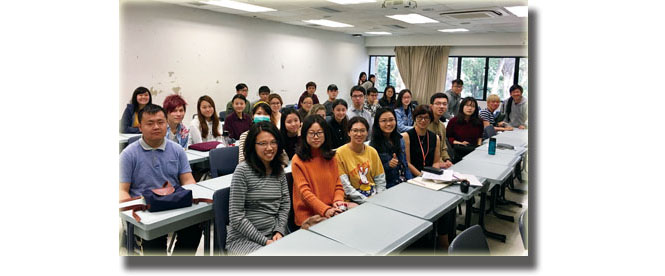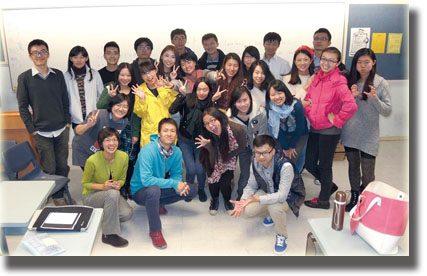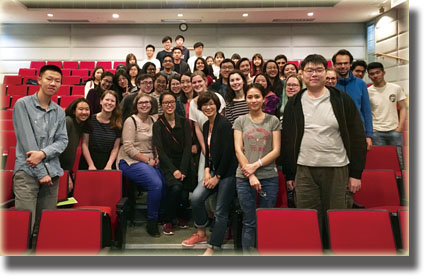|
Dr. Chen Ju-chen obtained her Bachelor's degree in Psychology from National Taiwan University and MA and Ph.D. degrees in Anthropology from Rutgers, The State University of New Jersey in the USA. She is interested in gender, migration, and aspiration. Her scholarly interests cover a few groups and geographic locations: female migrant workers (Mingong) in China, Filipino domestic workers in Hong Kong, and independent musicians and music event organizers in Hong Kong and Taiwan. She has been teaching in the Department of Anthropology since 2009. Over the years, she has taught four General Education courses, namely, UGEA2180 Chinese Culture and Society, UGEC2653 Gender and Culture, GENA 2192 Women, Men and Culture and GESC2140 Media, Culture and Society.
|
 |
Teaching Philosophy
I love teaching. I believe that a university classroom should be an equal place in the world. In such classes, teachers and students inspire each other with their wildest imagination, and then carefully and logically explore those ideas together. Learning through teaching is the best thing I have in life.
In the preface to his book From the Soil (Xiangtu Zhongguo), Chinese anthropologist Fei Xiaotong recalled that in class he liked to teach what he was contemplating instead of offering well-polished thoughts, even though this could mean introducing immature ideas that could be proven wrong. He believed that the responsibility of a teacher is not merely to deliver knowledge but to guide students to step into the unknown. I cannot agree with Fei more. I view teaching as a precious opportunity to share and to learn: to share generously with students what I know, what I believe, and what I cannot yet answer; and to learn eagerly from the lively imagination and fresh perspectives of students.

When I started teaching at CUHK, a senior colleague advised me: "Just take your students as your equal and have fun!" This advice has since become my teaching motto. When I felt intimated about sharing immature ideas, "taking students as my equal" helped me to ease any anxiety I experienced and encouraged me to be as sincere with the students as I could. Students always recognized the honesty and, in return, were more willing to share their not fully developed ideas too. When I had a classroom of uncertain, shy, and hence seemingly indifferent students (either at the beginning of semesters or when the materials are more difficult), "having fun" helped students (and me!) to have a few good laughs together, relax, and re-focus.
What I enjoy most about teaching is seeing students open their eyes wide or frown in thought when they hear a novel idea. I enjoy seeing them raise their hands in slow motion or ask questions with hesitation because they are still consolidating their views. Students quickly know whether a teacher genuinely takes their ideas seriously; they have told me repeatedly that they appreciate me showing respect for their thoughts, and providing them opportunities to express themselves, even when I disagree with them, freely. As they put it, "that is the only thing we need." It is invaluable that students know the worth of their curiosity.

How to be a good story teller—how to succinctly explain your arguments, get the class' attention, and cultivate student's curiosity—is certainly a challenge in teaching. Another equally—if not more difficult—challenge of teaching is to be a good listener. Being an attentive listener requires the teacher to put aside her agenda at least briefly, to give students time to develop their thoughts, and to see the connection between what heard and what taught earlier. Another senior colleague once shared with me: "Rather than dutifully sticking to your lecture outline, prepare just a couple of key points for each class, and remain ready to improvise in response to student's questions." With this advice in mind, my teaching experience did prove that the preparedness for improvisation (which always implies tolerating some uncertainty) is another key to a most positive classroom experience.
On my journey to fulfill my dream of teaching, I am fortunate to have had many mentors—role models in books, inspiring and caring colleagues, and curious, critical and honest students. While they explained what good teaching is about in different ways, their messages are consistent. A good teacher is a daring adventurer who takes her students as partners on the journey to learn; she listens attentively and is enthusiastic in exchanging ideas. Anthropologists are known to be humble listeners in front of the people we study. We are always curious about what people know and how our values and perspectives are not the only ones that deserve respect. Anthropologists give up authority in exchange for the joy of knowing. On this point, anthropology certainly taught me to be a better teacher. I am very honored to receive the SCGE Exemplary Teaching Award in General Education. Humbled by the recognition, I am ever more determined to stand by my students when they dream big.

|











